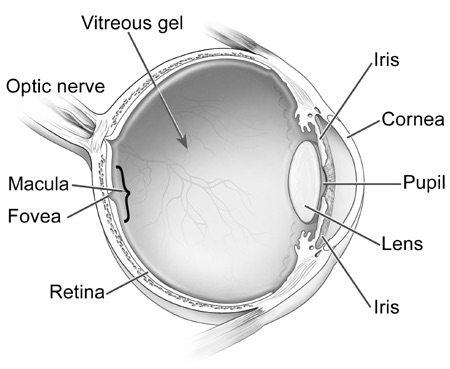Late effects: Cataracts
Some treatments for blood disorders require the use of medications or radiation that can increase the risk of developing cataracts. Because vision can have a significant impact on daily living, it is important for people who have received these treatments to have their eyes checked regularly.

What is a cataract?
A cataract is clouding of the normally clear lens of the eye.
Cataracts often develop slowly.
As the clouding increases, vision can be affected.
How does a cataract affect vision?
The eyes are remarkable organs, allowing light to be converted into electrical impulses that are transmitted to the brain, where images are perceived. Light enters the eye through a clear layer of tissue known as the cornea. The cornea bends and focuses the light, and sends it through the opening of the eye known as the pupil. The pupil controls how much light enters the eye.
Behind the pupil is the lens of the eye, which focuses the light onto the retina, the membrane along the back wall of the eye. The nerve cells in the retina change the light into electrical impulses and send them through the optic nerve to the brain, where the image is perceived. When the lens becomes cloudy due to a cataract, the image delivered to the retina becomes blurry.
What are the symptoms of a cataract?
Common symptoms of cataracts include:
- Painless blurring of vision
- Sensitivity to light and glare (such as seeing a halo around street lights)
- Double vision in one eye
- Poor night vision
- Fading or yellowing of colours
- The need for frequent changes in prescriptions for glasses or contact lenses
What treatments increase the risk of developing cataracts?
Medications
Certain medications increase the risk of developing cataracts, including:
- Busulfan
- Corticosteroids, such as prednisone and dexamethasone
Radiation therapy
Radiation therapy to the following areas can also increase risk:
- Eye and surrounding tissue (orbits)
- Head or brain (cranial)
- Total body irradiation (TBI)
The risk for cataracts increases with:
- Higher radiation doses
- Frequent exposure to sunlight
- The passage of time (the longer off therapy the survivor is)
- Increasing age
What monitoring is recommended?
You should:
- Have an eye examination every year during your regular check-up
- Report any deterioration in vision to your doctor - do not be tempted to buy ‘off the shelf’ glasses
- See an eye specialist (ophthalmologist or optometrist) for a full eye evaluation
How often should you see an eye specialist?
See an eye specialist every year if you have had:
- Total body irradiation (TBI)
- High doses (30 Gy or 3000 cGy/rads or higher) of radiation to the head, brain or eyes
- A tumour involving the eye
See an eye specialist every 3 years if you have had lower doses of radiation
How are cataracts treated?
Not all cataracts need treatment. In many cases, an ophthalmologist may monitor the vision closely over many years, and will recommend treatment if and when it becomes necessary.
The only treatment for cataracts is surgical removal of the lens and replacement with an artificial lens. Today, cataract surgery is a low risk procedure that is performed on an outpatient basis and usually is successful in restoring vision.
How can I keep my eyes as healthy as possible?
You can keep your eyes healthy if you:
- Wear sunglasses with UV protection when in bright sunlight
- When participating in sports, be sure to select protective eyewear that is appropriate for the sport. Eyewear worn for sports should be properly fitted by an eye care professional
- Avoid toys with sharp, protruding or projectile parts
- Never play with fireworks or sparklers of any kind to avoid accidental injury
- Be careful when working with hazardous household chemicals
- Wear protective eyewear when using a lawnmower, power trimmer, or edger, and when working with dangerous equipment in the workshop
If you do experience an eye injury, seek medical attention promptly.

Late Effects Clinic
We care for and treat people who have ongoing health problems caused by cancer or cancer treatment.
Find out more